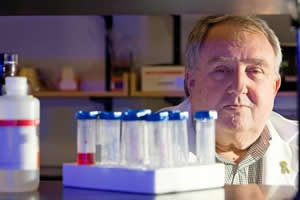Ponatinib acts against the most resistant types of chronic myeloid leukemia
Written by Nicole Fawcett.
Phase I trial shows third-generation drug helps patients after other treatments fail
PLEASE NOTE:
On October 31, 2013, the FDA asked the manufacturer of ponatinib, ARIAD Pharmaceuticals, to suspend marketing and sales of the chemotherapy drug because of the risk of blood clots. To learn more about this, please see Suspension of the marketing and sales of the leukemia drug Iclusig (ponatinib)
Press release courtesy of MD Anderson Cancer Center.
ANN ARBOR, Mich. - A previously invincible mutation in chronic myeloid leukemia has been thwarted by an investigational drug in a phase I clinical trial reported in the The New England Journal of Medicine.

All 12 patients in the trial with chronic phase CML and the T315I mutation had no traces of CML cells in the blood after treatment with ponatinib. Eleven had a major reduction in CML cells in the bone marrow and nine achieved a complete response, with no CML cells in the marrow.
T315I is present in up to 20% of patients and blocks the docking station where three other successful CML drugs normally connect to the mutant protein to stop the cancer.
"The fight with cancer is an ongoing battle. It can constantly 'outsmart' us by developing mutations and other changes. In this study, we were able to come up with a treatment that is capable of overcoming the most resistant mutation in CML, and thus represents a new evolution in targeted therapy," says senior study author Moshe Talpaz, M.D., Alexander J. Trotman Professor of Leukemia Research at the University of Michigan Rogel Cancer Center.
"This shows we can 'fingerprint' the tumor and develop treatment which not only fits a certain cancer, but a very specific molecular subset within the cancer," Talpaz adds.
Ponatinib also induced high response rates among the broader group of patients who had mutations other than T315I or no detectable mutations. Among 65 patients with relapsed or resistant CML at varying stages of the disease or with Philadelphia-chromosome positive acute lymphoblastic leukemia (ALL), 67% with other mutations and 46% with no mutations achieved a complete response.
"Ponatinib is a promising new treatment for patients who have run out of options and its activity against a wide variety of mutations and in patients with no known mutations suggests a broad range of efficacy for this drug," said trial principal investigator Jorge Cortes, M.D., professor in The University of Texas MD Anderson Department of Leukemia.
Cortes will report the results of a pivotal phase II clinical trial of ponatinib at the 54th ASH Annual Meeting and Exposition in December.
The U.S. Food and Drug Administration in October accepted a new drug application by ARIAD Pharmaceuticals for accelerated review of ponatinib for patients with resistant or intolerant CML or Philadelphia chromosome-positive acute lymphoblastic leukemia (ALL).
Targeted therapy success story
CML is caused by the abnormal gene BCR-ABL, which occurs when two chromosomes swap portions of their DNA from the BCR and ABL genes during cell division. This abnormality is called the Philadelphia chromosome and the resultant BCR-ABL fusion protein drives the overproduction of white blood cells that characterizes CML. BCR-ABL is a tyrosine kinase, a type of protein that acts as an on-off switch by attaching a phosphate group to other proteins.
Discovery of the drug imatinib (Gleevec) revolutionized treatment of CML. Now approximately 90% of patients survive for at least five years, up from about 50% before imatinib. Two second-generation drugs, nilotinib (Tasigna) and dasatinib (Sprycel) are more potent than imatinib. Each can be used in frontline therapy.
"Imatinib is a terrific drug, however 30% to 40% of CML patients become resistant to it," Cortes said. "Nilotinib and dasatinib work for 40% to 50% of these patients."
Preclinical experiments indicated ponatinib acts against BCR-ABL and all known mutant forms of the protein.
The most common non-hematologic side effects were skin disorders, fatigue and nausea. Pancreatitis occurred in 11 patients and was a serious adverse event in eight. Nine of the 11 experienced one episode of pancreatitis, only two discontinued treatment.
Twelve patients with acute myeloid leukemia also participated in the trial. A separate paper will address those results.
Additional authors: Hagop Kantarjian, M.D., of MD Anderson's Department of Leukemia; Neil Shah, M.D., Ph.D., University of California, San Francisco; Dale Bixby, M.D., Ph.D., University of Michigan Comprehensive Cancer Center; Michael Mauro, M.D., and Brian Druker, M.D., Oregon Health Science University Knight Cancer Institute; Ian Flinn, M.D., Ph.D., Sarah Cannon Research Institute, Nashville, Tenn., Thomas O'Hare, Ph.D., and Michael Deininger, M.D., Ph.D., Huntsman Cancer Institute, University of Utah; and Simin Hu, Ph.D., Narayana Narasimhan, Ph.D., Victor Rivera, Ph.D., Tim Clackson, Ph.D., Christopher Turner, M.D., and Frank Haluska, M.D., Ph.D., all of ARIAD Pharmaceuticals, Cambridge, Mass.
Funding: ARIAD Pharmaceuticals.
